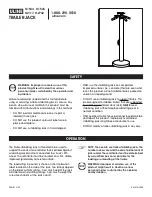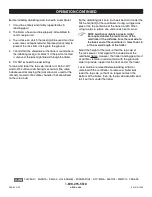
PAGE 2 OF 2
0515 IH-1544
OPERATION CONTINUED
Before installing stabilizing jacks beneath a semitrailer:
1. It must be entirely and stably supported by its
landing gear.
2. The trailer wheels must be properly immobilized to
resist creep or roll.
3. The surface on which the jack(s) will be used must be
even, level, compacted and improved (concrete) to
prevent the jack from sinking into the ground.
4. Confirm that the underside of the trailer is sound where
the stabilizing jack(s) will contact it. If the point of contact
is unsound, the jack might break through the trailer.
5. DO NOT exceed the load ratings.
To raise and lower the top cap: models H-1545, H-2117
and H-2732 utilize a ratcheting mechanism (the same
handle used for moving the jack around is used for the
ratchet), model H-1544 utilizes handles that are affixed
to the screw hub.
Tip the stabilizing jack onto its wheels and roll it under the
hitch-end (front) of the semitrailer. If using a single jack,
place it on the centerline of the trailer’s width. When
using two jacks, place one under each front corner.
NOTE: Additional stabilizing jacks might
be required under the rear corners of the
semitrailer if the distance from the rear axle to
the back end of the semitrailer is more than 1⁄4
of the overall length of the trailer.
Adjust the height of the jack so that the top cap of
the jack presses firmly against the underside of the
semitrailer frame. However, the trailer landing gear must
at all times remain in solid contact with the ground in
order to provide support for the front end of the trailer
Jacks must be removed before backing a tractor
underneath the semitrailer. To remove a trailer jack,
lower the top cap so that it no longer contacts the
bottom of the trailer; then, tip the jack backwards and
roll it out from under the trailer.
π
CHICAGO • ATLANTA • DALLAS • LOS ANGELES • MINNEAPOLIS • NYC/PHILA • SEATTLE • MEXICO • CANADA
1-800-295-5510
uline.com















